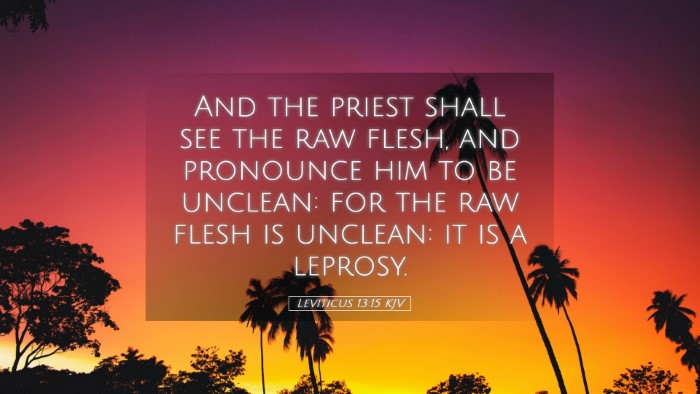Commentary on Leviticus 13:15
Leviticus 13:15 states: "And the priest shall look upon the raw flesh in the diseased skin, and the priest shall pronounce him unclean: for the raw flesh is unclean: it is a leprosy." This verse is situated within the broader context of the laws concerning leprosy, which serve both a physical and spiritual purpose within the community of Israel.
General Context of Levitical Laws
The book of Leviticus is fundamentally about holiness, setting the Israelites apart as the chosen people of God. The regulations concerning diseases, particularly skin diseases like leprosy, reflect the seriousness with which God regards purity and the communal aspect of worship. This passage also foreshadows the greater symbolic implications of sin and the need for atonement.
Insights from Public Domain Commentaries
Matthew Henry's Commentary
Henry emphasizes the importance of the priest's role in diagnosing and categorizing these diseases. The priest is not just a spiritual leader but also serves as a medical examiner, indicating the intersection of faith and health within the Hebrew society. The determination of "unclean" is not merely a physical declaration, but it serves a symbolic purpose, highlighting the broader theme of separation from sin.
- The Role of the Priest: The priest symbolizes God's authority, acting as a mediator between God and the people. His judgment on leprosy reflects a deeper spiritual reality—understanding the nature of sin and its effects on the community.
- Significance of "Unclean": The term "unclean" conveys a condition that necessitates separation. In this context, it signifies the need for restoration and highlights God's desire for purity among His people.
Albert Barnes' Notes on the Bible
Barnes provides insight into the physiological aspects of the affliction described in Leviticus 13. He notes that the "raw flesh" signifies a serious condition that has intensified, hence demanding attention. The diagnosis of leprosy serves as a warning and a call to the community to maintain rituals of purity.
- Evolution of Symptoms: Barnes discusses how the visibility of the disease affects the perception of the afflicted individual and reflects a moral decay that parallels the spiritual state of sin.
- Communal Health and Purity: The concern for 'unclean' individuals ties into the larger community health, skillfully underscoring the idea that love for one's neighbor includes vigilance against sin and moral impurity.
Adam Clarke's Commentary
Clarke elaborates on the investigative process of the priest, interpreting the act of examination as profoundly significant. He underlines that the priest's inspection was a meticulous process, indicating that God cares about the details of our lives and situations, challenging individuals to introspect and seek clarity.
- Spiritual Examination: Clarke posits that just as the priest examines the physical body, believers are encouraged to examine their souls regularly to identify any 'leprosy'—areas of sin that threaten spiritual health.
- Symbolism of Healing: The 'raw flesh' metaphor encourages a reflection on the need for spiritual healing, anchoring the theology of redemption in the afflictions faced by humankind.
Theological Implications
The passage from Leviticus 13:15 can be seen as echoing New Testament themes of purity, healing, and the need for a Savior. In light of Christ’s work, leprosy serves as a powerful metaphor for sin: just as the afflicted were social outcasts, so too sin separates individuals from God’s presence.
Jesus and Leprosy
In the New Testament, Jesus’s approach to lepers—healing them and restoring them to community—underscores the fulfillment of the law in Christ. This passage invites theological reflection on the nature of Christ's redemptive work and its implications for believers today.
Pastoral Application
For pastors and theologians, Leviticus 13:15 serves as a confrontational reminder of the significance of spiritual health. It encourages the community of faith to be vigilant about sin, to seek purity, and to extend grace and healing to those who are suffering, recognizing the transformative power of God's mercy.
Conclusion
In summary, Leviticus 13:15 not only addresses an individual's physical condition but also invites theological reflection on the nature of sin, the importance of community health, and the grace of God. By combining the insights from Matthew Henry, Albert Barnes, and Adam Clarke, this commentary presents a holistic perspective, urging each reader to see the eternal truths woven throughout the intricate laws of Leviticus.


